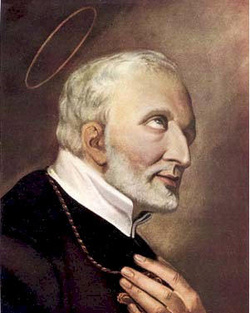
That he might not turn aside from his work, he bound himself by a vow never to lose any time. Inflamed with the love of souls, he toiled to gain them to Christ and to amend their lives, not only by preaching of the word of God, but also by writings full of holy learning and godliness. It is a marvel how many hatreds he stilled, and how many backsliders he led again into the paths of salvation. He was eminently devoted to the Mother of God, published a book on her glories, and when he was earnestly speaking thereof in his sermons, it happened more than once that all the people openly saw a strange brightness fall upon him from her image, till all his countenance shone, and he was rapt in an ecstasy. The sufferings of the Lord and the Holy Eucharist were ever before his eyes, and to them he spread abroad a wonderful love. When he was praying before the Altar of the Blessed Sacrament, or celebrating the Holy Liturgy, which he never failed to do every day, through the seraphic violence of his love, he wept burning tears, or shook with strange movements, or became altogether beside himself. He joined a wonderful innocence and purity, which he never polluted by the stain of deadly sin, to a wonderful depth of repentance, and chastised his body with hunger, iron chains, hair-cloth, and scourgings even to blood-shedding. Among all these things he was remarkable for the gift of prophecy, the power of seeing into the hearts of men, the ability to be in more places than one at the same time, and other miracles.
He firmly and perseveringly refused all high places in the Church which were offered him, but Pope Clement XIII absolutely commanded him to take the Bishoprick of the Church of Santa Agata dei Goti. On becoming a Bishop, the only change which he made in the hardness of his life was that of his outer raiment. There remained, too, the same simplicity of meats, the same strong zeal for Christian discipline, the same determined will to put down sin and keep out false doctrines, and the same earnestness in all the duties of a shepherd of souls. In his tenderness to the poor, he spent among them all the revenues of his Church, and in a year of famine sold the furniture of his own house to feed his starving people. He was all things to all men; and brought nuns to lead a more perfect life, while he saw to it that a monastery was opened for nuns attached to his own Congregation. On account of grievous and continual sickness, he resigned his Bishoprick, and poor as when he had left them, poor he returned among his disciples. On the 1st day of August, in the year 1787, he peacefully died at Nocera-dei-Pagani, amid the tears of his followers. He was then ninety years of age; his body was worn out with old age and hard work, and with chronic gout, and other painful maladies, but the freshness of his mind never failed to the last, in talking and writing on heavenly things. In the year 1816 Pope Pius VII, finding him famous on account of his good works and miracles, enrolled his name among those of the Blessed. God still glorified him by new signs and wonders, and on the Feast of the Most Holy Trinity, in the year 1839, Gregory XVI, with solemn pomp, numbered him among the Saints of the Church. Lastly, Pope Pius IX, in accordance with a resolution of the Congregation of Sacred Rites, gave him the title of Doctor of the Universal Church.




